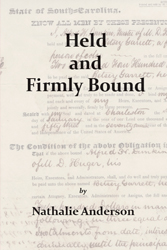
Held and Firmly Bound
Nathalie Anderson
$14 from Muddy Ford Press.
Summary
In Held and Firmly Bound, Nathalie Anderson explores the implications of a family document – a statement of indebtedness between the races in pre-Civil War Charleston. How has a white Carolinian come to owe a substantial sum to Betsey Garrett, identified on the document as a free person of color? How today do we respond to the document’s resonating phrase, holding the debtor “held and firmly bound” to repay that debt? Anderson’s poems investigate variations on these themes, inviting readers to find reflected in these circumstances our own longing, terror, perplexity, magnanimity, and shame.
Author Bio
Nathalie Anderson is the author of four books of poetry – Following Fred Astaire, Crawlers, Quiver, and Stain – and libretti for four operas. Her poems have appeared in such journals as Atlanta Review, DoubleTake, Natural Bridge, The New Yorker, and The Recorder. She was raised in Columbia SC, and educated – at Agnes Scott, Georgia State, and Emory University – in Atlanta. A 1993 Pew Fellow in the Arts, Nathalie Anderson serves currently as Poet in Residence at the Rosenbach Museum and Library in Philadelphia; and she directs the Program in Creative Writing at Swarthmore College.
Nathalie Anderson is an award-winning poet and librettist. The author of four previous books of poetry – Following Fred Astaire, Crawlers, Quiver, and Stain – she is a Professor in the Department of English Literature at Swarthmore College, where she directs the Program in Creative Writing.
Praise for Held and Firmly Bound
In Held and Firmly Bound, Nathalie Anderson explores the implications of a family document – a statement of indebtedness between the races in pre-Civil War Charleston. How has a white Carolinian come to owe a substantial sum to Betsey Garrett, identified on the document as a free person of color? How today do we respond to the document’s resonating phrase, holding the debtor “held and firmly bound” to repay that debt? Anderson’s poems investigate variations on these themes, inviting readers to find reflected in these circumstances our own longing, terror, perplexity, magnanimity, and shame.
The starting point of Claudia Rankine’s theory of the Racial Imaginary is the conviction that “our imaginations are creatures as limited as we ourselves are,” and that “every act of imaginative sympathy inevitably has limits.” In Held and Firmly Bound, Nathalie Anderson, a white poet of Southern origins, concurs, even as she charges into territory that is rife with racial stereotypes prevalent in the canonical literature of the American South. Pinning her poem to an actual ancestral document from 1853 which records a large debt owed to Betsey Garrett, “a free person of color,” Anderson tries to poetically conjure the real life Betsey without presuming the typical appropriations of persona poetry. Thus, instead of the imagined, ventriloquial voice of Betsey Garrett, Anderson gives us a series of oblique glimpses of her from the perspective of the white people among whom she lived as they sought to understand the origins of her freedom and the source of her power in the antebellum era – a freed slave, a wronged woman, a holder of white secrets, a source of white guilt, an extraordinary, marketable talent. Part narrative poem, part lyric interrogation, part historical investigation, concerned with both the sociology and metaphysics of race, and at all times, profoundly psychological, Held and Firmly Bound keeps bringing us back to Anderson’s central point: that each of is “held and firmly bound” by the consciousness inscribed within our own imaginations, and by the inevitable revelation of that consciousness through our utterance. A fascinating collection.
–Kate Daniel, author of A Walk in Victoria’s Secret
Located at the intersection of family and region, Nathalie Anderson’s sequence of magnificently wrought lyric poems seek to determine how a distant relative, one M.D. Huger, came to be indebted to a free woman of color named Betsey Garrett for the princely sum of $2400. The language in these wonderfully luminous poems helps the reader to imagine the variety of circumstances that may have led up to the transaction. Endeavoring to illuminate the “complicated possibilities,” of such an extraordinary state of affairs, Anderson’s chapbook achieves on multiple levels: gesturing toward the many forms human frailty can assume while insisting that it is only through sustained acts of truthmaking that matters such as these can yield up their redemptive potential. A singular achievement whose implications are impossible to deny.
–Herman Beavers, author of Obsidian Blues








